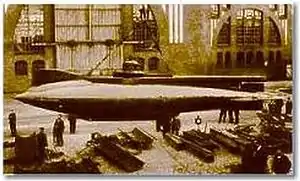 | |
| History | |
|---|---|
| Name | Forel |
| Builder | Friedrich Krupp Germaniawerft, Kiel, Germany |
| Launched | 8 June 1903 |
| Acquired | 24 May 1904 |
| Commissioned | 21 August 1904 |
| Decommissioned | 31 May 1910 |
| Fate | Sunk 17 May 1910 |
| General characteristics | |
| Displacement |
|
| Length | 13.1 m (43 ft 0 in) |
| Beam | 2.1 m (6 ft 11 in) |
| Draft | 2.1 m (6 ft 11 in) |
| Propulsion | 1 electric motor, 1 shaft, 60 shp (45 kW) |
| Speed | 5.5 knots (10.2 km/h; 6.3 mph) |
| Range | 25 nm (9.8×10−7 in) at 4 knots (7.4 km/h; 4.6 mph) submerged |
| Test depth | 30 m (98 ft) |
| Complement | 4 |
| Armament | 2 x 18 in (457 mm) external torpedo tubes (bow) |
Forel (Russian: Форель, German: Forelle - Trout) was a midget submarine designed by Raimundo Lorenzo de Equevilley Montjustín and built by Krupp in Kiel, Germany.[1] The design was an experimental design built as a private venture by Krupp in hopes of attracting a contract from the Imperial German Navy. Although the design proved moderately successful, the submarine did not attract German naval attention.[1] She was purchased by the Imperial Russian Navy (IRN) in 1904 and served with the IRN until she was lost in a diving accident in 1910. She had the distinction of being the first submarine to have been built in Germany, preceding SM U-1. Forel was succeeded in service by the Krab class (one ship).
Design
Forelle was a single-hull boat designed with internal ballast and compensating tanks.[1] She had fixed angled aft planes, and movable forward units for dive control. This boat had to be carried into action on board a surface ship and launched close to its target, as she was not fitted with a separate surface propulsion system.[1] She was equipped with two Whitehead torpedoes.
Operational history
The Imperial Russian Navy purchased the submarine in May 1904 for service in the Russo-Japanese War.[1] It was shipped from Kiel to Liepāja by railway, together with a team of German engineers to train the Russian crew, and was commissioned at Kronstadt on 21 August 1904. It was then sent via the Trans-Siberian Railway to Vladivostok, arriving on 29 September, and joined the Siberian Flotilla on 2 October, becoming the first Russian submarine in the Pacific. Although the submarine did not see combat during the Russo-Japanese War, its presence had an important psychological effect.
Forel continued to operate out of Vladivostok after the war; however, by 1908 it was considered obsolete and was re-classed as a training vessel. The submarine sank in an accident on 17 May 1910.[1] The crew managed to escape, and the ship was salvaged from a depth of 26 metres (85 ft). Vice Admiral Ivan Grigorovich authorized it to be returned to Liepāja for repairs, but shipping was never implemented.
References
External links
![]() Media related to Forel (submarine, 1903) at Wikimedia Commons
Media related to Forel (submarine, 1903) at Wikimedia Commons